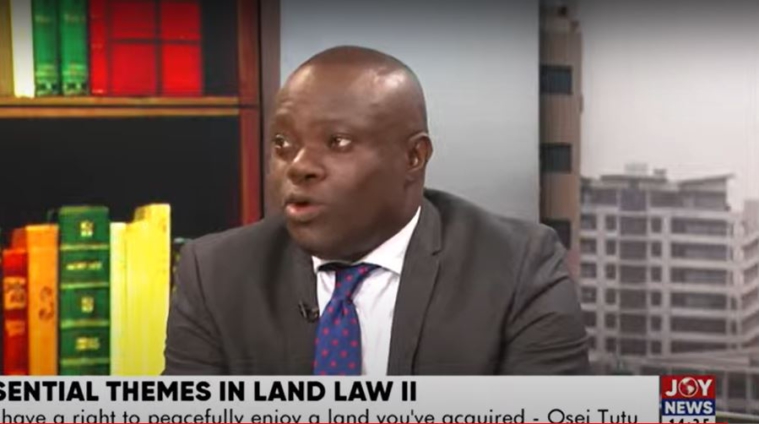High Court Judge, His Lordship, Justice Alexander Osei Tutu, has admonished all and sundry to investigate the ownership and documents attached to the land they intend to buy before doing so.
Speaking in an interview on JoyNews’ The Law on Sunday, he said this is important in order to avoid unnecessary litigation.
“You don’t rise and say that I am going to buy land. If the person is saying that my father left us property maybe for a man and his siblings and one person wants to dispose of the property. You need to ask the requisite document, whether letters of administration have been obtained,” he stressed.
He emphasised that before purchasing land, "you should find out whether the person granting the land to you has the locus and whether he is legally permitted to give out the land."
Touching on the acquisition of Stool lands, he stated that the buyer must also probe “whether the one transferring the document to you is the occupant of the Stool.”
According to him, although the law allows and recognizes for oral conveyance, “what is important is to find out whether the land you are acquiring does not have any associated challenges.
The High Court Judge also condemned the practice whereby some persons storm construction sites to demand digging fee from land developers.
He noted that it is unlawful for anyone to demand 'digging fee' from builders.
He said that such acts are is punishable, adding that the culprits can go to jail for up to 15 years for demanding 'digging fee' from a land developer.
“The law has some rights attached to them, they are implied. One of the implied covenants which the law provides is that the grantor is supposed to give the grantee quiet enjoyment of the land. That means that for the period that the person will be on the land, you will not disturb him and his occupation of the land.
“So in this context, after alienating the land to a grantee, I do not see the authority that the grantor has to turn around to say that I am demanding this and that from you. In my view, it is illegal,” he said.
Latest Stories
-
2024 Election: NDC accuses NPP of printing fake ballot papers
1 min -
A democracy that fails to solve its own problems is a questionable democracy – Dr Muhammad Suleiman
4 mins -
Our fight against corruption is more talk, less action – Mary Addah
12 mins -
CHRAJ report settles matters against Kusi Boateng – Lawyer
18 mins -
Growing dissatisfaction with democracy demands citizen-centered governance – Mavis Zupork Dome
21 mins -
Ghana’s Democracy: Choices, not elections will drive change – Benjamin Offei-Addo
26 mins -
PRESEC-Legon marks 86 years with launch of groundbreaking AI lab on November 30
29 mins -
Limited citizen participation threatens Ghana’s democracy – Prof. Kwesi Aning
39 mins -
Contractor storms basic school to drive out students from classroom, claiming government owes him
58 mins -
The quest for peaceful election: religious and traditional leaders should be part of election observers
1 hour -
NDC has better policies to boost economy through agricultural, oil sectors – Ato Forson
1 hour -
Yaw Ampofo Ankrah calls for Kurt Okraku and Executive Council to resign over AFCON failure
1 hour -
Coalition of teachers to boycott December election over unpaid salary arrears
1 hour -
Uphold ethics in fight against fraud – First National Bank CEO
1 hour -
CHRAJ recommends forensic audit of National Cathedral project
1 hour

